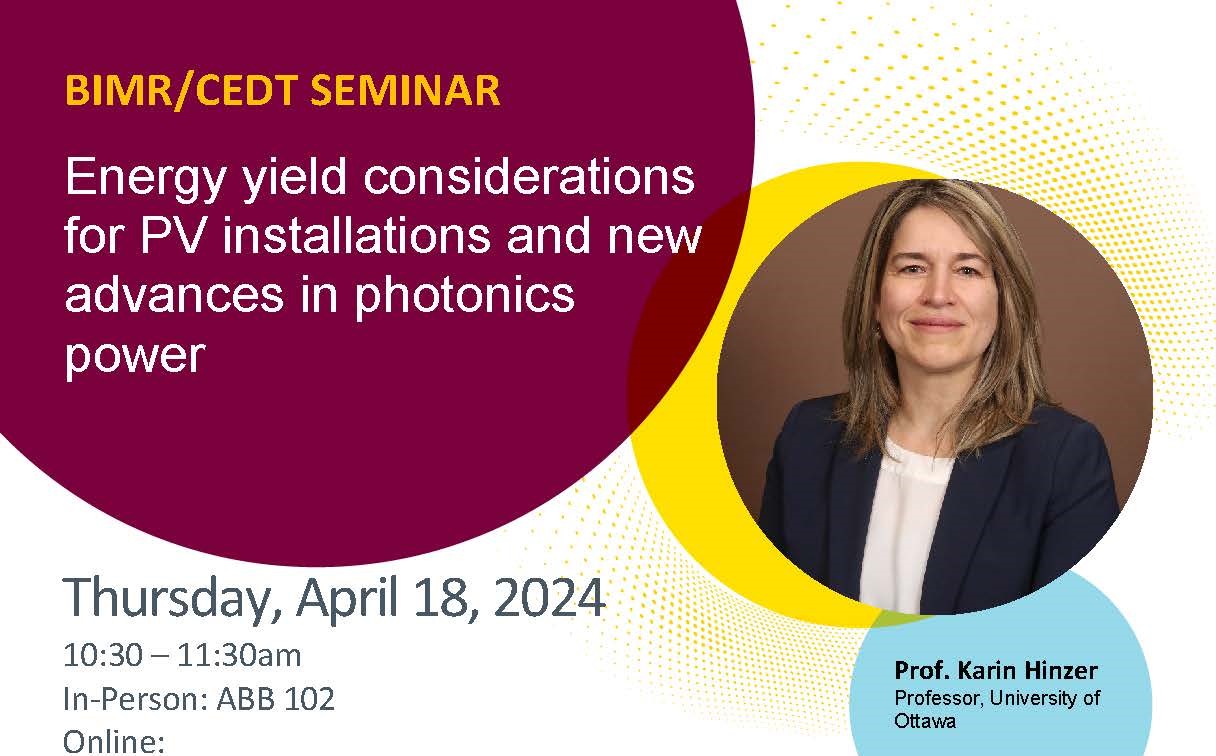Energy yield considerations for PV installations and new advances in photonics power
Apr 18, 2024
10:30AM to 11:30AM

Date/Time
Date(s) - 18/04/2024
10:30 am - 11:30 am
Categories
Prof. Karin Hinzer
Professor, University of Ottawa
The ubiquity of photovoltaic systems is essential to achieve carbon neutrality by 2050. Energy scenarios indicate that we must go from our present 1 TW of deployed installations up to 100 TW. Following a short overview of present technologies, I will discuss our recent results on energy yield calculations for fixed-tilt, tracked and vertical photovoltaic systems. I will present a new method to calculate efficiencies for bifacial systems taking into account spectral albedo. Using novel metrological instruments, I will demonstrate how spectral effects influence energy yield daily and yearly for high latitudes. I will present results on the effect of high reflective surfaces, including snow, on bifacial systems. Photovoltaic devices can be adapted to transfer photonic energy using lasers. This can be done in free space or using optical fibers. This technology enables electrification of low-noise continuous current systems. I will present our recent results on the design and performance of photonic power converters based on GaAs and InP. To optimize design of complex multijunction devices, I will present a methodology based on dimensionality reduction algorithms using principal component analysis; I will show how this technique compares to the Beer-Lambert absorption law.
Bio:
Karin Hinzer received the BSc, MSc, and PhD degrees in physics from the University of Ottawa, Ottawa, Ontario, Canada, in 1996, 1998, and 2002, respectively. She is Vice-Dean, Research of the Faculty of Engineering and a Professor at the School of Electrical Engineering and Computer Science with a cross-appointment in the department of Physics at the University of Ottawa, and the University Research Chair in Photonic Devices for Energy. She has made pioneering contributions to the experimental physics of quantum dots marked by two landmark papers in Science. She gained extensive experience in the design and fabrication of group III-V semiconductor devices while at the National Research Council Canada, Nortel Networks and then Bookham (now Lumentum). Cost reduction strategies and liaison with remote fabrication facilities strongly feature in her industry experience.
Professor Hinzer joined the University of Ottawa in 2007 where she founded the SUNLAB, the premier Canadian modelling and characterization laboratory for next generation optoelectronic devices and photovoltaic systems. Her research involves developing new ways to harness the sun’s energy. From 2007 to 2017, she was the Tier II Canada Research Chair in Photonic Nanostructures and Integrated Devices. In 2010, she was the recipient of the Inaugural Canadian Energy Award with industry partner Morgan Solar for the development of more efficient solar panels. In 2015, she received the Ontario Ministry of Research and Innovation Early Researcher Award for her contributions to the fields of photonic devices and photovoltaic systems, and in 2016, she was the recipient of the University of Ottawa Young Researcher Award. She is a IEEE senior member and a past member of the College of New Scholars, Artists and Scientists of the Royal Society of Canada. Professor Hinzer is the principal investigator of the Natural Sciences and Engineering Research Council of Canada Collaborative Research and Training Experience Program titled “Training in Optoelectronics for Power: from Science and Engineering to Technology” (NSERC CREATE TOP-SET, 2017-2024), a multi-disciplinary training program involving three universities which has trained over 160 students and postdoctoral fellows so far.
Professor Hinzer has trained over 190 highly-qualified personnel, graduating 24 master’s students and 11 PhD students. She is an editor of the IEEE Journal of Photovoltaics. She has published over 210 refereed papers and her laboratory has spun-off three Canadian companies in the energy sector. Her research interests include new materials, high efficiency light sources and light detectors, solar cells, solar modules, new electrical grid architectures and power converters.
In-Person: ABB 102
Online: https://mcmaster.zoom.us/j/99034826154
Meeting ID: 990 3482 6154
Passcode: 597592

